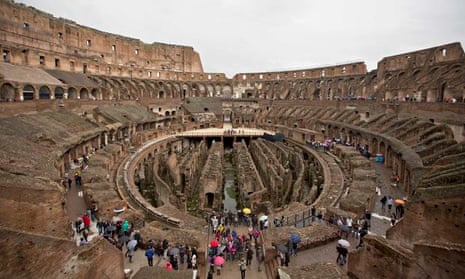In the latest episode of tourists behaving badly in Rome, a Russian has been fined €20,000 (£15,800) for carving his initial into the Colosseum.
The 42-year-old tourist used a stone to carve a 25cm “K” into a wall inside the ancient amphitheatre. He was caught in the act by a guard and arrested by police, before being fined and given a four-month suspended prison sentence.
The director of the Colosseum, Rossella Rea, said the €20,000 fine was justified as the visitor had damaged “a magnificent and symbolic monument”. “You cannot write on a historic wall, it’s absolutely forbidden,” she said.
However, she denied tourists were running amok at the world-famous site. Out of six million annual visitors, five have been stopped by police this year for scrawling on the amphitheatre. An Australian and his son were caught, as well as a teenager from Brazil and another from Canada. The minors escaped being fined because of their age.
The vandalism was much worse under the Fascists and was at its peak in the 1930s, Rea said.
The ancient Romans also lent themselves to graffiti, with their works now preserved and proudly displayed at the Colosseum. Depicting arena scenes and celebrating famous gladiators, they are incomparable to modern-day vandalism, Rea said: “There are beautiful designs, which are historic and very important.”
Darius Arya, a Rome-based archaeologist, said the fine would send a powerful message to would-be vandals. “It’s an extraordinarily high fee. This says ‘we have no patience’; they’re upping the ante as a new form of protection.”
The decision has already won the backing of some tourists in Rome. Kirstie Rick, on holiday from England, said it was “a good thing” to punish tourists who misbehave.
She saw scrawls of graffiti while queuing up to visit the ancient monument, despite numerous signs warning tourists to abide by the rules. “It might be an idea to put the cost on [display],” she said, suggesting the €20,000 fine should be enough to stop the vandals.
